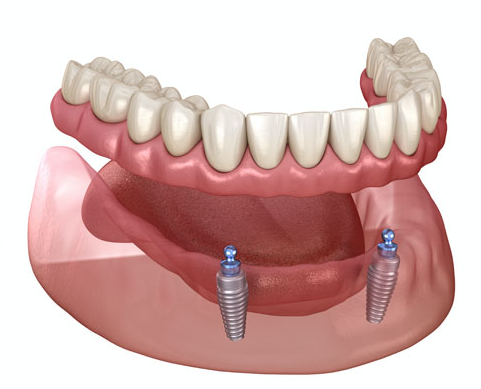What are implant supported dentures?

You may know me as a proponent of zinc-free denture adhesives, but what if I told you that you could phase out denture adhesives altogether? It may seem like a fantasy, but I assure you there is a way, and it is rapidly gaining popularity: implant-supported prostheses.
What are implant-supported prostheses?
If you are unfamiliar with the burgeoning field of implant supported dentures dentistry, you may not have heard of this new technology. Simply put, the dentist places metal implants into the bone structure of the mouth. Dentures are then created or adapted to have holes or indentations corresponding to where these implants protrude from the jawbone or upper palate. Anti-sneeze prosthesis adjustment. Implants can also significantly improve the safety of ill-fitting partial dentures.
It seems painful…
Also, be honest with yourself; Aren’t your ill-fitting dentures causing you pain? The overwhelming response from people who have chosen implant-supported dentures is that they would gladly accept the short-term pain of recovering from implant surgery rather than the constant, ongoing pain of dentures that slip, slip, and wear down the inside of their mouth. every day. Add to that the pain you’re likely to experience from the long-term effects of ingesting denture adhesive, and the choice quickly becomes clear.
Am I a candidate for implant-supported prostheses?
Only a dentist trained in implants can guarantee this. The elderly must have sufficient bone structure to anchor the implants. These techniques include bone graft surgery, synthetic bone implants, or even bovine (cow) bone implants. This is why it is so important to see a dentist trained in implants; because only he is qualified to guide you in the choice of these additional options to support the implants. The benefit of this is that if you have implants, they can help anchor your bone and gum tissue and prevent further loss.
Are there any other considerations?
Recovery time is the other important consideration when choosing implant-supported prostheses, and this will be another area where your implant-trained dentist can help you make decisions. Some patients may undergo implant surgery and start wearing their new prosthesis a few days later, once the swelling has subsided. Other patients will need two to four months of recovery time between implant surgery and when they start wearing their prosthesis.
How much does it cost?
As you would expect with any surgery, the cost can be considerable. If you have good dental insurance, it may cover at least part of the cost; Many dentists who offer implant-supported dentures also offer financing options to help their patients have the best possible quality of life.
Dentures can boast a long and storied history. In fact, the earliest examples are of Etruscan origin, having been created using real human and animal teeth over two and a half millennia ago. Since then, dental prostheses have become much more sophisticated in a continuous march to provide patients with superior performance. However, this same sophistication can be confusing to people who are unaware of the options available to them, making it much more difficult for them to find the perfect prosthesis for their mouth without consulting trained and experienced dentists.
Introduction to dental prostheses supported by implants and similar devices
Here is a brief introduction to some of the more common prostheses that may be available to patients through their dentists, including implant-supported prostheses:
Depending on their exact situation, dentists can provide these patients with fixed or precision versions, meaning partial dentures are permanent or removable as needed. In some cases, dentists also recommend partial dentures for their patients because their presence in the mouth limits excessive movement of a patient’s remaining teeth, a problem that can contribute to further tooth loss if not controlled.
I




